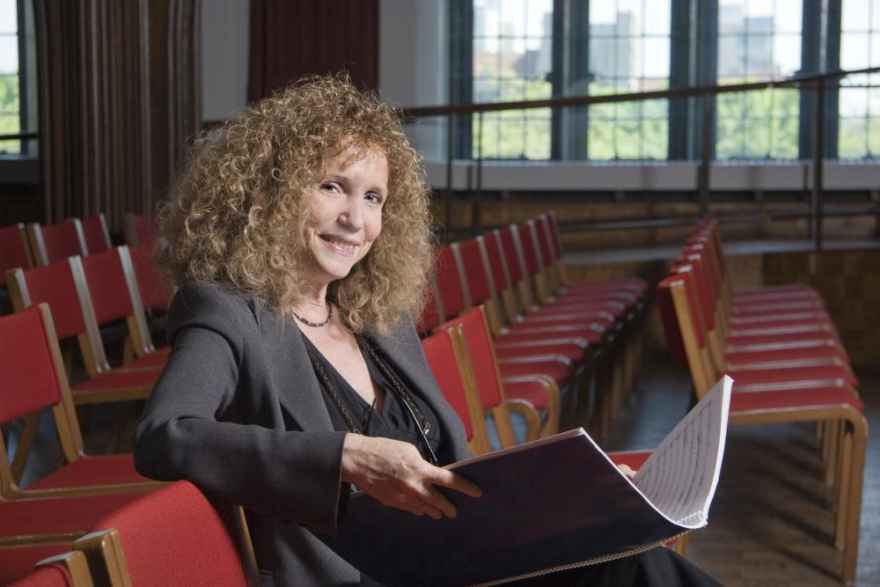Shulamit Ran on 50 Years of Contempo

The following appeared in UChicago News on 10 December.
It’s been 50 years since University of Chicago composition professor Ralph Shapey founded the Contemporary Chamber Players, a group dedicated to the performance of the work of living composers. Now called Contempo, the collective has earned a formidable reputation for its fearless performance of contemporary music, bolstered by partnerships with resident ensembles eighth blackbird and Pacifica Quartet. Shulamit Ran, who has served as the artistic director of Contempo since 2002, looks ahead to the 50th-anniversary season, which features world premieres of three commissioned works by luminaries John Eaton, Sofia Gubaidulina and Gunther Schuller.
Contempo is not the only arts organization celebrating an important anniversary this year. Court Theatre, Rockefeller Chapel’s Bells of Summer, the Smart Museum and the Renaissance Society are celebrating major milestones as part of Artennial.
How did you get involved with Contempo?
Contempo—then the Contemporary Chamber Players—was one of several principal reasons I came to the University of Chicago. Even then it had a reputation as a premiere ensemble that puts forth of the music of our time in an authoritative and powerful way. The presence of this institution at the University of Chicago was always a shining light.
Since coming to the University of Chicago, this organization has been an integral part of my life here as a composer, as a colleague of Ralph Shapey’s, as an admiring audience member and as a learning audience member. It has served as a great source of inspiration for me all these years.
What in your time as artistic director are you most proud of?
It took a grand vision to establish the Contemporary Chamber Players 50 years ago. That unrelenting sense of vision has been sustained. The music we present to our listeners is challenging. At the same time, I think we’ve been able to cultivate an audience that relishes the kind of music we present. We’ve been able to put together concerts that are vibrant and compelling. When you are at our concerts, I think you feel that you are experiencing a special moment in the history of today’s music.
One of the things that has always been central to the Contempo mission is its relationship to our composition program here at the University. Our doctoral students, who come to us from all over the world, are a superb group of young composers. At the beginning of the season, there is the blank page, but by spring-time, on the two Contempo concerts featuring their music, you have an incredible harvest of music that never ceases to surprise.
A special annual event has been the Double Bill. Once a year, we have brought together “our” kind of musicians and repertoire with a major artist who is generally outside of the classical art music tradition. We’ve been able to expand the audiences for both forms. It’s been very exciting to see full halls of people reacting with great curiosity and enthusiasm and energy to music that in some cases has not been part of their previous experience.
Why do you think Contempo has succeeded in finding an audience for challenging music?
It’s all really in the choice of the music, and in the powerful performance that it receives. If you play music that is new and difficult in a way that is not totally committed, then of course you’re not going to convince anyone on the listening end of it! The music has been selected with great care and great passion and with a desire to have a programmatic flow, each piece in some way highlighting the other. From beginning to end, there is a sense of it all coalescing—in vital, virtuosic, committed performances. I think audiences can tell the difference.
What are you most excited about in the upcoming season?
Our commissioned premieres will be a special focus. Fostering the creation of new work has been an essential component of the Contemporary Chamber Players since its very inception. This season we introduce works by three extraordinary major composers: John Eaton, who is our own professor emeritus, and Gunther Schuller, who has been one of the iconic figures of American music for decades. The third commissioned work is by Russian composer Sofia Gubaidulina, one of the most revered composers of our time.
Each time that a finished score arrived, it was like a lightning bolt in terms of its excitement. I said to Gunther Schuler after I received his work, “This is like a shot of adrenaline!” Such energy, such youth, such vigor to it.
John Eaton’s piece is called “The End Of It.” As the title suggests, it is looking at life from the vantage point of advancing years. It is music of beauty and longing, both passionate and poignant. He wrote to me that in some way this work has meant more to him than any other work he has composed.
It is a great honor to have Sofia Gubaildulina write a work for us. Originally planned for 4 players, Gubaidulina suddenly added a second percussionist. With a huge array of ringing instruments including 13 gongs, I can just imagine the burst of inspiration that brought about this new way of thinking.
I know those three works will leave a real imprint in the ears of our listeners.
What does the future hold for Contempo?
No doubt Contempo will continue to evolve, change, chart out new territories, but I’m also very sure it will continue to be an ambassador for the level of thinking, activity and creativity that has always been its hallmark, and that of the institution of which it is part.